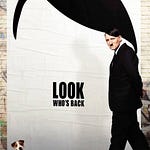I’ve posted a two part review of Barbie on Twitter, and a review of Oppenheimer. As I explain in the Oppenheimer review, it feels wrong to pair them, given the transcendent importance of that film and the silliness of its “rival.”
That being said, Rob and I have been thinking about both, and we’re here to entertain you, so we’re discussing them together. My Oppenheimer review nonetheless makes it clear that if you’re going to see one film, it should be that one. Here’s an excerpt.
I was not excited learning that Oppenheimer was going to be three hours long. No matter what the subject, that’s a long time to be sitting in the theater. I also wondered how Christopher Nolan could do the subject justice on the big screen. The scale and importance of World War II boggles the mind. A nearly endless list of larger than life figures. In the realm of politics, Hitler, Churchill, Roosevelt, Stalin, Mussolini. Clashes of great ideologies. At the same time, you had some of the most influential figures in the history of physics working together as part of the war effort on a weapon that would change geopolitics forever.
Despite all this, Nolan meets the challenge. Brilliant use of light, sound, explosions, as cut-in scenes, both to literally simulate the effect of the atomic bomb and as metaphors to reflect Oppenheimer’s tortured psychology. The film needs to be seen on the big screen to get the full experience. The characters are deep and compelling. There were many ways that the discussions about scientific concepts could’ve gone wrong, either too technical to show off the producer’s brilliance or too dumbed down to the point where it’s annoying. The script struck the right balance.
The film remains exciting throughout the three hours. Given the brilliance of the end result, it was only fitting that WWII and the atomic bomb received a treatment that was long enough to feel commensurate with the importance of the subject.
As for messaging, the commentary I’ve seen assumes that Nolan is trying to make Oppenheimer into a sympathetic character, a victim of McCarthyism, and give the message that communist espionage was no big deal. I have no idea what film these people saw. As the viewer finds out, Soviet espionage was real, and all of those who worried about spying in the Manhattan Project were obviously correct! From the perspective of the omniscient viewer, we know that Oppenheimer was not a spy (although in real life who knows), but he’s constantly showing bad judgment, by sleeping with women who are either his friends’ wives or communists, and giving up his infant son to his communist friends because he and his wife were sick of the baby’s crying.
The hero of the film is midcentury American society. The system works. It makes use of Oppenheimer's talents to win WWII, and then discards him, after a fair hearing, when he becomes an annoying primadonna after the war, as he seeks policy influence that his ego and awful judgment make him clearly unqualified for. The film makes you think it's going in the direction of a standard Hollywood sob story about McCarthyism. But those deciding on Oppenheimer's security clearance actually use good investigative procedures to get to the truth, and know that he's a loyal American. They tell him that, but also that he can't be trusted because he has awful judgment. And how can anyone think they're wrong?..
I was tempted to talk a bit about Barbie, but it feels silly to spend too much time on it, just because they happened to be released on the same day. History will always remember WWII and the creation of the atom bomb, as it will Chris Nolan for giving us Oppenheimer.
Do read the whole review. It’s up to over 200K views as of this writing, although that’s behind my review of Barbie, at over 500K, reflecting the relative success of each film at the box office.
Upon reviewing Barbie, some rando academic responded that I was just doing the conservative thing of trying to find something to be mad at. My response was au contraire, I actually wanted to distinguish myself from conservative influencers who tend to have more predictable cultural takes. Before seeing the movie, people had shared with me this thumbnail, which struck me as ridiculous.
A few years ago, someone made a movie about Blue State elites hunting Red Staters, and right wingers got it cancelled based on the theory that it was attacking them, when they were actually supposed to be the good guys. So conservatives are often not the most sophisticated art critics. It’s also worth mentioning that this movie was heavily promoted and became a cultural phenomenon even before its release, and I liked the idea of moving back towards a country where blockbuster films serve as Schelling Points for the larger culture. Barbie being good would’ve let me both differentiate myself from less sophisticated conservatives, and also appreciate a work of art that could represent a healthy trend, away from endless remakes of movies and back towards widely successful original storytelling.
But intellectual honesty compels me to tell the truth. Ben Shapiro was right. This movie was awful, both in terms of politics and of character and plot development. The trailer, which had given me hope, turned out to be a bait and switch on the audience. Shapiro’s review is in parts goofy, like when he complains about masturbation jokes, but most of his critiques are completely correct.
But that doesn’t mean we should despair at the kind of unsophisticated drivel that achieves commercial success in modern America. Men can still do great things, and Nolan’s body of work is one of the clearest examples we have of that. There are inspiring stories out there for those inclined to look.
Listen here or watch on YouTube.
Links:
Hanania review of Oppenheimer
Helen Andrews’ strange interpretation of Barbie
Ben Shapiro review
Michelle Goldberg on the meaning of Barbie and Taylor Swift, and my reaction to Goldberg
Michael Tracey on the Barbie marketing campaign













